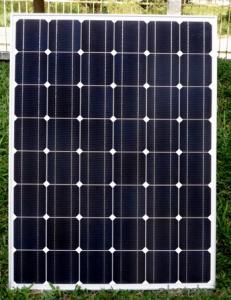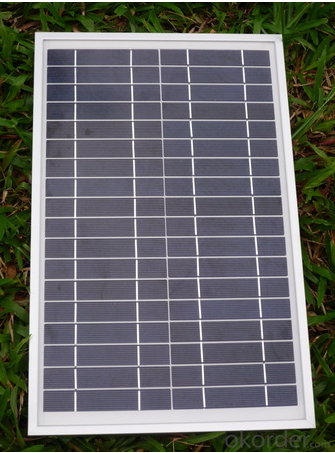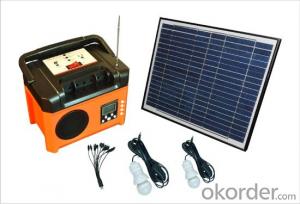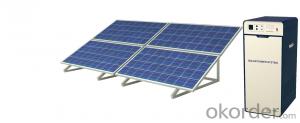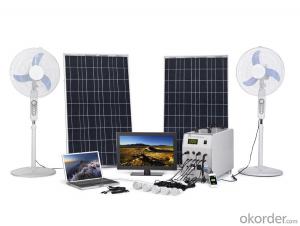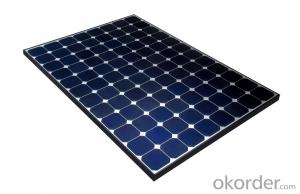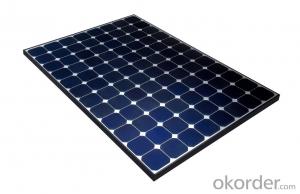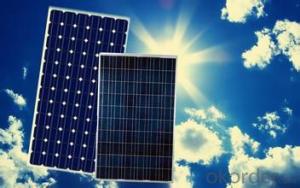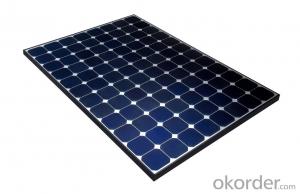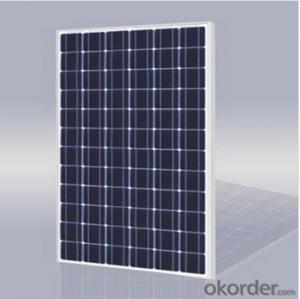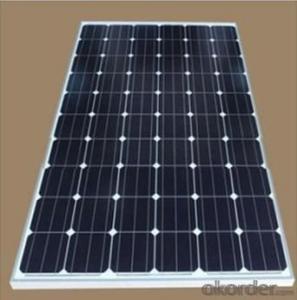400kw CNBM Monocrystalline Silicon Solar Energy Systems SES Panel for Home Use
- Loading Port:
- Shekou
- Payment Terms:
- TT OR LC
- Min Order Qty:
- 100 watt
- Supply Capability:
- 1000 watt/month
OKorder Service Pledge
OKorder Financial Service
You Might Also Like
Specification
400KW CNBM Monocrystalline Silicon Panel for Home Using
Production description
Solar power is the conversion of sunlight into electricity, either directly using photovoltaics (PV), or indirectly using concentrated solar power (CSP). Concentrated solar power systems use lenses or mirrors and tracking systems to focus a large area of sunlight into a small beam. Photovoltaics convert light into anelectric current using the photovoltaic effect.[1]
The International Energy Agency projected in 2014 that under its "high renewables" scenario, by 2050, solar photovoltaics and concentrated solar power would contribute about 16 and 11 percent, respectively, of theworldwide electricity consumption, and solar would be the world's largest source of electricity. Most solar installations would be in China and India.[2]
Solar energy is radiant light and heat from the Sun harnessed using a range of ever-evolving technologies such assolar heating, photovoltaics, solar thermal energy, solar architecture and artificial photosynthesis.
It is an important source of renewable energy and its technologies are broadly characterized as either passive solar oractive solar depending on the way they capture and distribute solar energy or convert it into solar power. Active solar techniques include the use of photovoltaic systems,
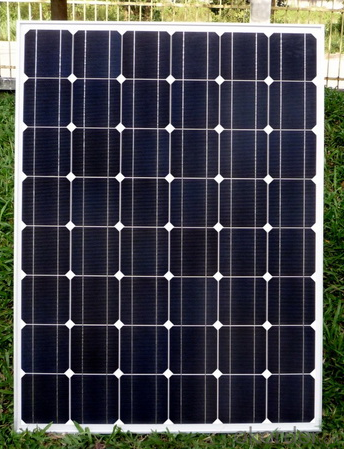
Feature
1.High conversion efficiencies resulting in superior power output performance.
2.Outstanding power output even in low light or high temperature conditions
3.Optimized design for ease of soldering and lamination
Physical characteristic
1. Rigorous quality control meets the highest international standards.
2. High-transmissivity low-iron tempered glass, strong aluminium frame.
3. Using UV-resistant silicon.
4. IS09001/14001/CE/TUV/UL
packaging
26pcs in one carton 6pallets in 20foot container 14pallets in 40 foot container.
- Q: Can solar energy systems be used for powering residential or commercial air conditioning systems?
- Indeed, residential or commercial air conditioning systems can be powered by solar energy systems. Solar energy, whether harnessed through the utilization of solar panels or solar thermal systems, can be converted into electricity to fuel air conditioning units. The functioning of solar panels involves the capture of sunlight, which is then transformed into direct current (DC) electricity. Subsequently, an inverter converts this DC electricity into alternating current (AC) electricity, enabling it to power various appliances, including air conditioning systems. Alternatively, solar thermal systems utilize the sun's heat to directly power air conditioning units. This is accomplished by heating a fluid, such as water or refrigerant, which is then employed to cool the air. By opting for solar energy systems to power air conditioning, not only can electricity bills be reduced, but carbon emissions can also be minimized, making this an environmentally sustainable and economically viable solution for both residential and commercial structures.
- Q: Is it possible to store excess solar energy for later use?
- Yes, it is possible to store excess solar energy for later use. This can be done through various methods such as using batteries, pumped hydro storage, or converting the energy into hydrogen or other forms of fuel for later use.
- Q: Can solar energy systems be integrated into existing electrical systems?
- Yes, solar energy systems can be integrated into existing electrical systems. By installing solar panels on rooftops or other suitable locations, the generated electricity can be fed into the existing electrical system, reducing the reliance on traditional sources of electricity and potentially lowering energy costs. However, it is important to ensure the compatibility and capacity of the existing electrical infrastructure to handle the additional power supply from the solar energy system.
- Q: Can solar energy systems be used for powering electric vehicle repair and maintenance facilities?
- Certainly, electric vehicle repair and maintenance facilities can utilize solar energy systems to power their operations. The facility can choose to install solar panels either on their rooftops or in the vicinity, enabling them to capture sunlight and convert it into electrical energy. This renewable energy source can then be used to operate the necessary equipment and tools for repairing and maintaining electric vehicles. By utilizing solar energy, repair and maintenance facilities can significantly decrease their dependence on traditional electricity grids and fossil fuel-based energy sources. This not only aids in reducing operational costs but also plays a role in minimizing the facility's carbon footprint, thus promoting sustainability and environmental responsibility. Furthermore, solar panels are particularly suitable for installation in electric vehicle repair and maintenance facilities due to the availability of large roofs or open spaces. Any surplus electricity generated during daylight hours can be stored in batteries or fed back into the grid, ensuring a continuous and uninterrupted power supply even when faced with cloudy or nighttime conditions. Additionally, solar energy systems can be used to directly charge electric vehicles themselves. By installing electric vehicle charging stations that are connected to the solar panels, the facility can provide customers with the option of renewable energy charging, making it more appealing for electric vehicle owners. In conclusion, employing solar energy systems to power electric vehicle repair and maintenance facilities is a sustainable and economically feasible solution that aligns with the increasing adoption of electric vehicles and the imperative to reduce greenhouse gas emissions.
- Q: Can solar energy systems be used for powering breweries?
- Yes, solar energy systems can be used for powering breweries. Solar panels can generate electricity that can be used to power various equipment and processes in breweries, including heating water, running pumps, and powering lights. Implementing solar energy systems can help breweries reduce their environmental impact, lower their energy costs, and promote sustainability.
- Q: How do solar energy systems affect the insurance premiums of a property?
- Solar energy systems can potentially affect insurance premiums of a property in a positive way. Installing solar panels can increase the value of a property, which may result in higher replacement cost coverage and thus slightly higher premiums. However, many insurance companies offer discounts or specialized policies for homes with solar energy systems, as they are considered less risky due to reduced reliance on traditional power sources and potential for energy savings. Ultimately, the impact on insurance premiums will vary depending on several factors, including the location, size, and efficiency of the solar energy system.
- Q: How can solar energy systems reduce electricity bills?
- Solar energy systems can reduce electricity bills by generating electricity from sunlight, which can be used to power homes and businesses. By using solar power, individuals can rely less on traditional electricity sources, resulting in lower energy consumption from the grid. This leads to decreased reliance on utility companies and ultimately reduces electricity bills. Additionally, excess solar energy can be sold back to the grid, further offsetting electricity costs.
- Q: Are there any noise or vibration issues with solar energy systems?
- Yes, there can be noise and vibration issues with solar energy systems, although they are generally minimal compared to other forms of energy generation. Solar panels themselves do not produce any noise or vibration as they convert sunlight into electricity. However, some components of the system, such as inverters or mounting structures, may generate a slight humming sound or vibration. This can vary depending on the quality and design of the system. Additionally, if the solar panels are installed on a roof or near living spaces, there might be some audible noise or vibration transmission through the building structure. However, these issues are typically considered minor and are often outweighed by the environmental and economic benefits of solar energy.
- Q: Can solar energy systems be used for heating and cooling a home?
- Yes, solar energy systems can be used for heating and cooling a home. Solar thermal systems can be installed to heat water for space heating and domestic hot water. Additionally, solar-powered air conditioning systems, such as solar-powered heat pumps, can be used to cool a home efficiently.
- Q: Can solar energy systems be used in areas with high pollution?
- Solar energy systems can indeed be utilized in areas with high pollution. In actuality, solar power presents a feasible solution to combat pollution in such areas. Although pollution may somewhat decrease the efficiency of solar panels, it does not render them completely ineffective. Solar energy systems can still generate electricity even amidst polluted environments. Additionally, implementing solar energy systems in areas with high pollution can yield various benefits. Firstly, it provides a clean and renewable energy source, reducing reliance on fossil fuels and diminishing greenhouse gas emissions. This assists in mitigating the pollution problem and enhancing air quality. Furthermore, solar power can be decentralized, allowing for local generation within polluted areas. This reduces the need for long-distance electricity transmission, which can further contribute to pollution. By generating energy on-site, solar systems help alleviate strain on the existing power grid and enhance overall energy system efficiency. Moreover, installing solar energy systems in polluted areas can raise awareness and promote a transition towards clean energy practices. It serves as a visible demonstration of renewable energy's potential, inspiring individuals and communities to adopt more sustainable practices and reduce pollution. While pollution does impact solar panel efficiency, advancements in technology and innovative designs can mitigate these effects. For instance, the utilization of anti-reflective coatings and regular cleaning of solar panels can enhance their performance in polluted environments. In conclusion, solar energy systems can certainly be utilized in areas with high pollution. They offer a clean and renewable energy source, aid in pollution reduction, and inspire a shift towards sustainable practices. Despite pollution's impact on efficiency, ongoing technological advancements make solar power a viable option even in polluted areas.
Send your message to us
400kw CNBM Monocrystalline Silicon Solar Energy Systems SES Panel for Home Use
- Loading Port:
- Shekou
- Payment Terms:
- TT OR LC
- Min Order Qty:
- 100 watt
- Supply Capability:
- 1000 watt/month
OKorder Service Pledge
OKorder Financial Service
Similar products
Hot products
Hot Searches
Related keywords
